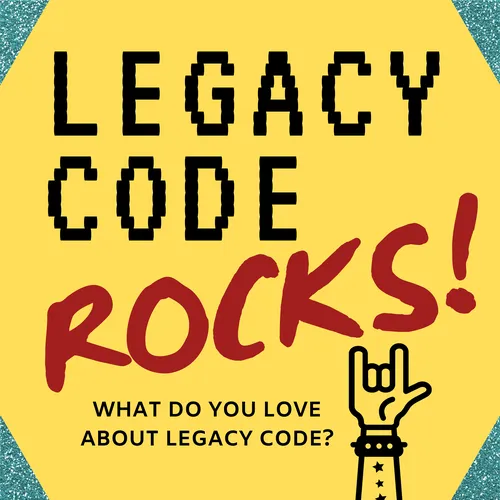
Legacy Code Rocks
Legacy Code Rocks explores the world of modernizing existing software applications. Hosts Andrea Goulet and M. Scott Ford of Corgibytes are out to change the way you think about legacy code.
If you’re like a lot of people, when you hear the words “legacy code” it conjures up images of big mainframes and archaic punch card machines. While that’s true — it only tells a small part of the story. The truth is, the code you leave behind is your legacy, so let's make it a good one.
- Update frequency
- every 13 days
- Average duration
- 43 minutes
- Episodes
- 162
- Years Active
- 2016 - 2024

PowerShell with Chrissy LeMaire
We seldomly dive deep into discussing any particular programming language on this show. However, today we are making an exception, and we talk with Chrissy LeMaire about PowerShell. Chrissy is a GitH…

Cloud Therapy with Bobby Allen
We behave with the cloud as a subset of technology like a teen who just learned how to drive. We are at the point where capabilities have far exceeded the ability to comprehend consequences. We have …

Economics of Technical Debt with Jim Humelsine
Technical debt is a recurring theme of this show. We talk about it almost as often as it pops out in any legacy code! Today we go back to discussing technical debt with Jim Humelsine. Jim has been a …

Adding Tests to Legacy Systems with Floyd Hilton
Many legacy systems lack adequate test coverage. They might not have much coverage at all, or the existing tests might be inefficient or paint a wrong picture about the stability of the system. Enhan…

Public Cloud in the Service of Applications with Sarah Musick
There has been a noticeable uptick in the adoption of public cloud providers. At the same time, the voices advocating for the abandonment of traditional data centers are getting louder. Keeping serve…

Legacy in Functional Programming With Eric Normand
Common Lisp was written in the 80s as a kind of an amalgam of the existing Lisps at the time. To make sure the Common Lisp would stay relevant, it was made backward compatible so that existing legacy…

The Value of Old with Marianne Bellotti
Software engineers perceive that technology advances in an orderly, linear fashion. This makes the novelties very attractive. However, the reality is that we tend to go through technology in cycles. …

Staying on Top of Dependency Freshness with Freshli
For most teams, dependency freshness is a pain that is often ignored. “If it works –don’t change it” is the prevailing attitude, but as a lot of applications become web-focused, dependencies inevitab…

Conquering the Fear of Legacy Code With Barry O’Sullivan
When developers talk about what they find exciting, they usually talk about new things. Very little content is about the actual job, about working in the existing system. When they do talk about lega…

Trans-Inclusive Design with Erin White
We like to think that technology is our objective and neutral assistant, our faithful lieutenant constrained with science and armed with cold, hard data. But this is incorrect. Technology reflects th…

Measuring Code Quality with Dan Sturtevant
Many analytical models can help you to measure some aspects of the quality of your codebase. However, only a combination of these models can give you complete information about your code's integrity …

Keeping Up with Ruby on Rails with Robby Russell
Ruby on Rails is a fast-moving community and it is not always easy to keep up with it. Given the efficiency of the framework, however, it is well worth trying. Today we talk to Robby Russell, creator…

Microservices Security with Prabath Siriwardena and Nuwan Dias
Security is a big topic with many facets, and this is especially true for microservices. Microservices deployment has been around for some time, but security didn’t get much attention from developers…

Legacy Coders with Clive Thompson
In the last episode of 2020, we took a stroll through the little known corridors of coding history with Clive Thompson. Clive is a technology and science journalist for the New York Times Magazine, W…

Celebrating Our 5th Anniversary with Johanna Rothman
Even before the COVID-19 pandemic changed the way we work and communicate, some people expected remote work to become more popular. The thought was, however, that the transition will be done by choic…

Legacy Code in Times of Crisis with Joao-Pierre Ruth
How has COVID-19 affected legacy code based systems, and what do we do to address the issue? Today we talk with Joao-Pierre Ruth, a technology journalist at InformationWeek where he covers DevOps and…

Quantified Task Management with Jason C McDonald
Knowing how to prioritize tasks and how to eliminate unnecessary assignments is a crucial skill for successful project management. The more complicated project is, the less obvious its priorities are…

Mending the Makers with Luke Rabin and Brandon Lewis
We often talk about the makers and menders dichotomy on this show. But we rarely dived deep into the dynamics of collaboration between these two groups of creatives. Today we talk with Brandon Lewis …

Communication Debt with Andrea Goulet
As menders working with legacy code, we are focused on identifying and reducing technical debt. But how much easier this task would be if the creator of the code or the previous maintainer left us so…

From a Monolith to Containers with Ben Johnson
Most, if not all, of the legacy projects feature monolithic application architectures. However, moving to containers can bring many benefits: consistency down the pipeline, no-touch deployment, bette…